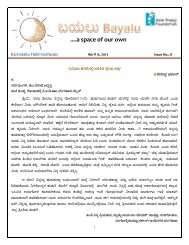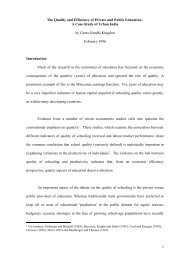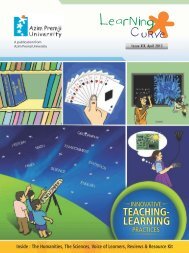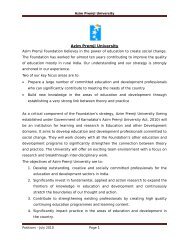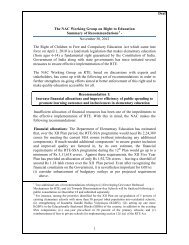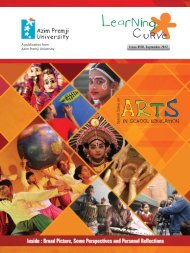Indesign Pagesnew.indd - Azim Premji Foundation
Indesign Pagesnew.indd - Azim Premji Foundation
Indesign Pagesnew.indd - Azim Premji Foundation
You also want an ePaper? Increase the reach of your titles
YUMPU automatically turns print PDFs into web optimized ePapers that Google loves.
I followed more or less the same methodology while working<br />
on this civilization with the students. The basic tools used<br />
were the booklet on Ancient Greece, reference work from<br />
a rich resource of library books, maps, pictures, charts,<br />
etc. One new skill that I felt would be worth imparting was<br />
the making of mind maps. Social studies as a subject calls<br />
for remembering many details, facts & fi gures and other<br />
information. I feel that mind maps are one of the easiest<br />
ways of putting together details as a cluster. Therefore, I<br />
used Tony Buzan’s techniques on mind maps and over a<br />
few sessions the students seemed quite adept at making<br />
beautiful, colour-coded mind maps on different themes<br />
related to Greece.<br />
Some of these topics included looking at the geographical<br />
features of the land, the structure of a Greek town, daily life<br />
and occupations of its people, the two main cities - Sparta<br />
and Athens with their very contrasting outlook toward life<br />
and their confl icts.<br />
The lesson on the emergence of democracy in Greece under<br />
the able leadership of Pericles was an experience worth<br />
remembering. This topic extended itself into many activities<br />
– a comparative study mainly through sharing of knowledge<br />
about the different forms of government, skits to show the<br />
difference between Monarchy, Aristocracy, Oligarchy and<br />
Democracy. To give the children an experience of what<br />
democracy is and how it works, I organised debates between<br />
teams on different aspects of their life in school. The idea<br />
was to convey how decisions on important issues of the<br />
state were taken up through discussions and debates.<br />
Section C<br />
Parthenon<br />
Vignettes – The Journey of a Class through Civilizations<br />
The concept of ‘street theatre’ was introduced when we<br />
began our exploration of Greek myths and legends. After<br />
reading around six to seven stories we decided to write<br />
scripts in small groups of four to fi ve students for each<br />
story. Then after a few rehearsals we invited other classes<br />
and teachers to watch the plays. For each play we chose a<br />
natural setting in different parts of the campus and stories<br />
were enacted with minimum number of props and costumes.<br />
The exciting part of the whole experience was the audience<br />
who moved with the actors from one place to another to<br />
watch the plays.<br />
We also watched a documentary called Greek – Crucible of<br />
Civilization. One very thought-provoking activity for me as a<br />
teacher happened when I made the children take charge of a<br />
few simple themes related to Greece and prepare themselves<br />
in small groups to teach the others in class. The children<br />
enjoyed being teachers for some time, but what’s worth<br />
sharing is the depth with which each group had prepared<br />
itself. Not only did they divide the responsibilities among<br />
themselves and teach their friends taking cues from the<br />
methods followed by their own teachers, but also brought in<br />
their own ways of imparting a lesson. In fact in those few<br />
sessions I learnt many more creative ways of teaching from<br />
my ‘student teachers.’<br />
We again took up a month long project in preparation for<br />
a school assembly on Greece. This time the students made<br />
a model of the Parthenon, mosaics depicting scenes and<br />
people (based on their study of Greek Mosaics), lovely<br />
cardboard models of Greek pots with exquisite paintings on<br />
them and a big 2-D model of Greek map. Themes chosen<br />
for plays included how meetings on important issues of the<br />
state were discussed in a very democratic manner by the<br />
citizens of Greece and three famous Greek myths. A beautiful<br />
Greek Vases<br />
Pg No: 88






